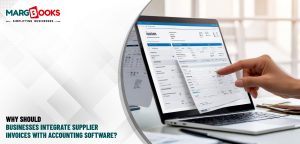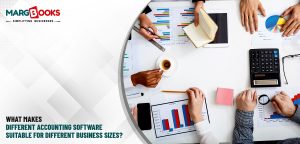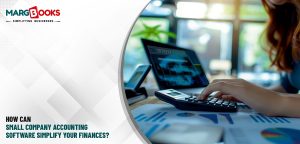When it comes to managing the finances of your company, choosing the right accounting software is crucial. A robust accounting solution not only simplifies financial management but also helps in maintaining accurate records, streamlining workflows, and ensuring timely compliance with tax laws.
With the increasing number of accounting software options available in the market, finding the top accounting software for your company can be a challenging task. In this blog, we will let you through the key factors you need to consider before making the final choice.
Why is Accounting Software Important for Your Business?
In today’s fast-paced business environment, relying on traditional methods like spreadsheets for accounting can lead to errors, inefficiencies, and wasted time. Accounting management software helps companies automate routine accounting tasks, such as invoicing, payroll, financial reporting, tax filings, and more. It minimizes human errors and improves the overall financial health of the business.
Moreover, industries such as pharmaceuticals require specialized solutions, Pharma Distribution Software, which helps them manage complex inventories, transactions, and sales distribution networks. Regardless of the industry, good accounting software will help you maintain clear, organized financial records while giving you a strategic overview of your company’s performance.
Key Factors to Consider When Choosing Accounting Software
Choosing the top accounting software for your company requires careful consideration. Here are some of the key factors to keep in mind:
1. Understand Your Business Needs
Before you dive into the features and benefits of different software options, it’s crucial to assess your business’s unique accounting needs. Ask yourself:
- What type of transactions do I handle? (Sales, purchases, payroll, etc.)
- How many users will need access?
- Do I need multi-currency or multi-country support?
- Do I have specific industry requirements like pharma distribution management?
Answering these questions will help narrow down your choices to software that best fits your business model.
2. Ease of Use
You don’t want to spend time training your staff for weeks just to learn how to use the software. The top accounting software must be intuitive, with a clean and easy-to-navigate user interface. Look for software that offers:
- User-friendly dashboards
- Customizable reports and data visualizations
- Automated reminders and alerts
If your team finds it hard to use, the software won’t serve its purpose. Ensure that the software is simple to understand, even for non-finance staff.
3. Scalability
As your business grows, your accounting needs will evolve. The accounting management software you choose should be able to scale with your company. A scalable solution ensures that:
- You can add more users or licenses as your team grows.
- You can manage more complex transactions as the business expands.
- The software can handle increased data storage requirements.
Scalability is essential for businesses looking to expand their operations without the hassle of frequently switching to new accounting tools.
4. Integration Capabilities
One of the most important factors in choosing the top accounting software is its ability to integrate with other software and systems used in your business. A seamless integration with:
- Customer Relationship Management (CRM) tools
- Inventory Management Software
- Point of Sale (POS) systems
For example, Pharma Distribution Software must be capable of connecting with accounting software to manage inventory, sales, and financial data seamlessly. Integration ensures that your systems work together, reducing manual work and improving accuracy.
5. Compliance and Security Features
Tax laws, regulatory standards, and industry-specific guidelines change frequently. The top accounting software should ensure that your business complies with all relevant regulations. Features to look for include:
- GST compliance: Automatically update to accommodate changes in tax laws.
- Data security: Encrypted data storage and secure cloud backups.
- Audit trails: Track who made changes to the records, ensuring full accountability.
Given the sensitive nature of financial data, your accounting software should offer robust security features to protect your business from fraud and data breaches.
6. Customer Support
Good customer support is often an overlooked but essential aspect of choosing accounting software. In case you run into issues or need guidance, the software provider must offer:
- 24/7 customer support
- Comprehensive knowledge base
- Dedicated account managers
If your software doesn’t come with solid customer service, you may face costly downtime or data errors.
7. Affordability
Lastly, consider your budget. While high-end software solutions may offer a wide array of features, they could also come with a hefty price tag. Small and medium businesses need to balance quality with affordability. Look for software that:
- Offers flexible pricing plans (monthly or yearly subscriptions).
- Provides a free trial to test its functionality before committing.
- Offers a pay-per-user model, which helps keep costs under control.
Popular Accounting Software Options in India
While there are many options available in the market, here are a few of the top accounting software solutions that are widely used by businesses in India:
1. MargBooks
MargBooks is one of the most popular accounting solutions for small and medium-sized businesses in India. It offers a variety of features, including:
- GST-ready invoicing and filing: Helps businesses comply with Indian tax regulations.
- Inventory management: Track stock and manage the supply chain seamlessly.
- Reports and analytics: Generate detailed financial reports for better decision-making.
- Pharma Distribution Software Integration: MargBooks offers industry-specific solutions for pharmaceutical businesses, helping them manage distribution channels and sales effectively.
2. BookKeeper
BookKeeper is a relatively unknown accounting software used by freelancers and small shopkeepers. Some of its features include:
- Basic GST invoicing
- Offline billing support
- Inventory tracking (limited functionality)
- Simple reporting tools
BookKeeper has limited scalability and lacks advanced automation, making it less suitable for growing businesses.
3. Vyapar Lite
Vyapar Lite is a stripped-down version of the Vyapar app, targeted toward small vendors and retailers. Some of its key features include:
- Manual invoice creation
- Basic expense logging
- No cloud access or user collaboration
- Minimal report generation
Vyapar Lite is very basic in nature and is best suited for businesses with minimal accounting needs.
4. MyBooks Basic
MyBooks Basic is a little-known accounting solution offering core accounting tools with limited support. Some of its key features include:
- Manual transaction entry
- Basic tax calculation
- Limited integrations
- Slow reporting interface
MyBooks Basic lacks automation and real-time features, making it difficult to manage modern business operations efficiently.
Conclusion
Choosing the top accounting software for your company requires thoughtful consideration of your unique business needs, scalability, ease of use, integration capabilities, and budget. Whether you are in the pharmaceutical distribution business or another industry, investing in the right accounting management software will help you save time, reduce errors, and ensure compliance with tax regulations.
If you’re looking for a comprehensive solution, MargBooks offers a blend of features that cater to businesses of all sizes, including those in the pharma distribution sector.




